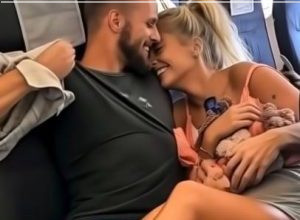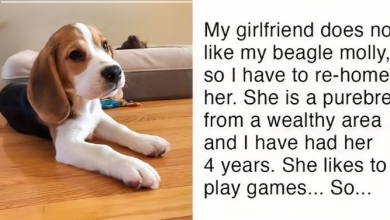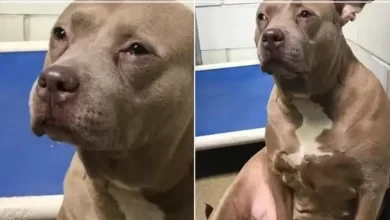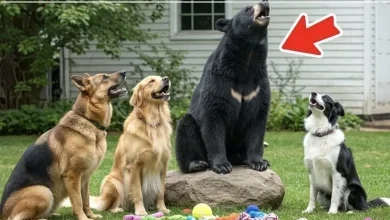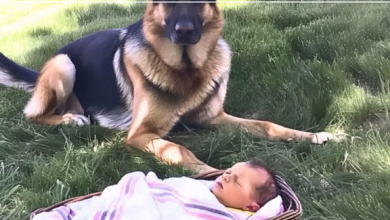THE THERAPY DOG CLIMBED INTO HIS BED—AND THAT’S WHEN HE BROKE HIS SILENCE
I’d been bringing my therapy dog, Riley, to the hospital for some time. Most days, patients lit up the moment he entered—eager hands reaching for his golden fur, soft laughter following the wag of his tail.
But this visit felt different.
The nurses guided us into a quiet room where an elderly man lay motionless, his gaze fixed on the ceiling. His name was Mr. Callahan. He looked worn, distant—like his voice had been missing for a long time.
“He hasn’t responded to much,” one nurse murmured. “Maybe Riley can reach him.”
I gave Riley a simple cue. Without hesitation, he climbed onto the bed, resting his head gently on Mr. Callahan’s chest.
There was only silence.
Then—a long, deliberate breath.
Mr. Callahan’s hand twitched, barely at first, then slowly moved to rest on Riley’s back.
I didn’t dare breathe.
And then, in a voice cracked with age and silence, he whispered, “Good boy.”
The nurse gasped. My eyes welled with tears.
But it was what he said next that truly stunned us.
“Marigold…” he murmured, the word fragile yet clear, like a lost song.
“Marigold?” I echoed, unsure if I’d heard him right.
He turned slightly toward me, his faded blue eyes flickering with a distant light. “She brought me marigolds every Sunday. Said they matched my hair when I was young.” A faint smile touched his lips as he gently scratched Riley behind the ears. “She never stopped bringing them, even after…” His voice drifted off, heavy with emotion.
The nurse shifted beside me, leaning in to whisper, “He hasn’t said anyone’s name in months. Not since…” She didn’t finish.
Riley, sensing the shift, let out a soft whine. It seemed to bring Mr. Callahan back to now. He gave Riley a light pat, then looked at me again. “You remind me of her,” he said unexpectedly. “The way you look at your dog. She loved animals too.”
I felt my throat tighten. Unsure of what to say, I simply smiled and asked, “Who was she?”
For the first time since we entered, Mr. Callahan sat up a little straighter, his eyes softened by memory. “Her name was Eleanor. We grew up in a little town no one remembers. She always believed in me, even when I didn’t.” He paused, fingers still resting on Riley. “We married right after high school. Everyone said we were too young. But we made it work—for fifty years.”
His voice was steeped in both love and sorrow, and something in it told me the story had a hard turn ahead.
“What happened?” I asked gently.
His expression clouded. He sighed deeply. “She passed two years ago. Cancer. They said it was fast, but watching her go… it felt endless. When she died, everything faded. I stopped talking, eating, living. Even the marigolds died—I couldn’t bring myself to care for them.”
My heart ached. I glanced at the nurse, whose eyes shone with tears. This wasn’t just a breakthrough. It was a man returning to himself—piece by painful piece.
Riley nudged Mr. Callahan’s arm again, drawing a soft laugh. “You’re persistent,” he said. “Just like Eleanor.”
And suddenly, it all clicked. This wasn’t just a lucky visit. Riley had become a bridge—between memory and the present, between silence and healing.
As if confirming my thoughts, Mr. Callahan added, “Eleanor always wanted a dog. We never had room. She would’ve loved him.” He nodded toward Riley, who thumped his tail. “Maybe she sent him.”
The room stilled. It wasn’t a dramatic claim—just a quiet comfort. A belief that love somehow endures.
Then came another surprise. “Can you take me outside?” he asked. His voice was both hopeful and hesitant.
I looked to the nurse, who nodded with a smile. “Of course,” I said, helping him upright. With Riley leading, we slowly made our way to the courtyard.
The sun was setting, casting everything in gold and rose.
When we reached a bench surrounded by flower beds, Mr. Callahan stopped. “Marigolds,” he whispered, eyes shining. “They planted marigolds here.”
He sat, fingers trembling as he touched the petals. Tears slid down his cheeks—not from grief, but from love rediscovered.
That night, as I tucked Riley into his bed, I thought about what we’d witnessed. It wasn’t just about getting a man to speak again. It was about connection. About how love can reach us even when we think it’s long gone.
Loss leaves its mark. We lose people, dreams, even parts of ourselves. But healing doesn’t mean forgetting. It means learning how to carry their memory forward.
Sometimes that comes in the form of a flower. Sometimes in the warmth of a dog’s touch.
If this story touched your heart, please share it. Someone out there may be waiting for a reminder that healing is always possible—and that love, in one form or another, always finds its way back. ❤️
